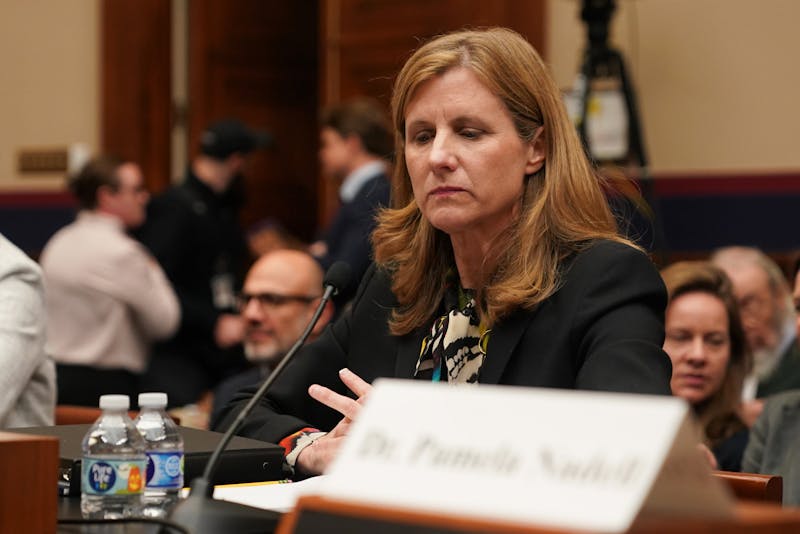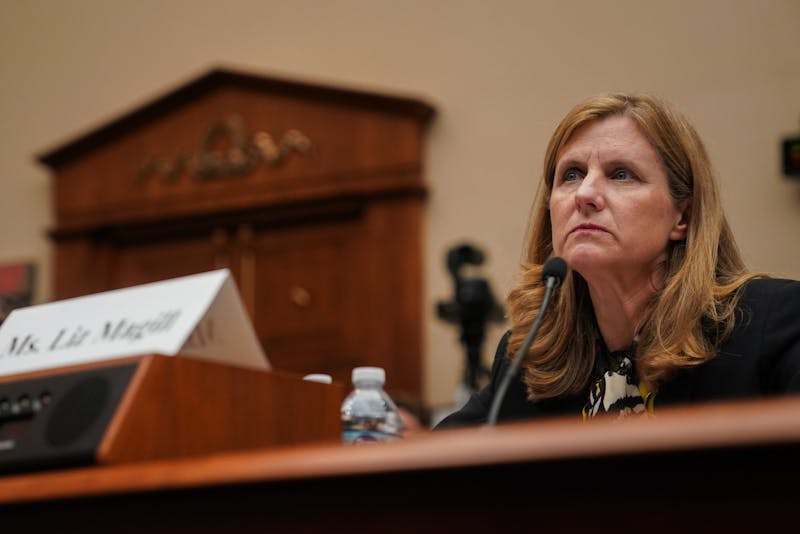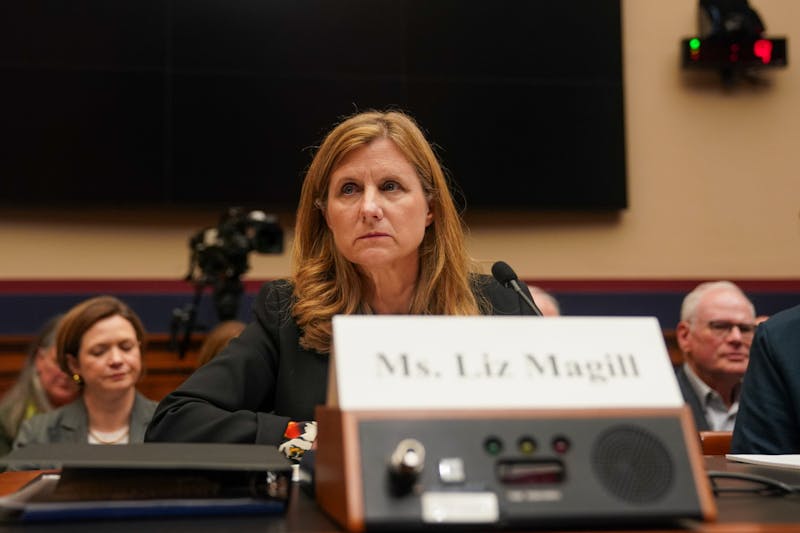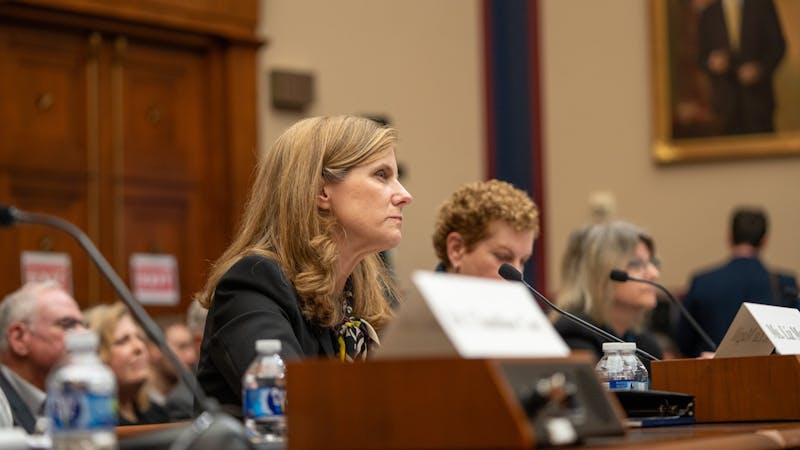
Members of Congress and Pennsylvania politicians across both parties applauded Penn President Liz Magill’s resignation.
The announcement of Magill’s resignation on Saturday came after unprecedented nationwide media attention following remarks at a congressional hearing on Tuesday where Magill said it was “context dependent” when Rep. Elise Stefanik (R-N.Y.) asked her whether calling for the genocide of Jewish people violates Penn’s code of conduct — referencing calls for "Intifada revolution" among some protesters on campus.
House Committee on Education and the Workforce
Stefanik, the No. 3 House Republican, whose exchange with the three university presidents led to amplified calls for Magill’s resignation, wrote on X, formerly known as Twitter, “One down. Two to go.”
“This is only the beginning of addressing the pervasive rot of antisemitism that has destroyed the most ‘prestigious’ higher education institutions in America,” Stefanik wrote.
She added that the congressional investigation into Penn that was announced following the hearing will continue despite Magill’s resignation.
“These universities can anticipate a robust and comprehensive Congressional investigation of all facets of their institutions' negligent perpetration of antisemitism including administrative, faculty, funding, and overall leadership and governance,” Stefanik wrote, adding that the “forced resignation of Magill” is the bare minimum of what is required.
Rep. Virginia Foxx (R-N.C.) released a statement through the House Committee on Education and Workforce X page regarding Magill’s resignation, writing that “she welcomes her departure from UPenn.” The statement said that Magill had “three chances to set the record straight” in response to Committee member Stefanik’s question about whether calls for Jewish genocide would be in violation of Penn’s code of conduct.
“Instead of giving a resounding yes to the question, she chose to equivocate,” Foxx — who is the chair of the committee — wrote in the statement. “What’s more shocking is that it took her more than 24 hours to clarify her comments, and even that clarification failed to include an apology to the Jewish students who do not feel safe on campus.”
After the congressional hearing, Foxx told The Daily Pennsylvanian that “If higher education were doing its job, then I don’t think we’d have students demonstrating and being antisemitic."
Foxx added that students are "running the campuses" while adults are "just abandoning them and not giving. the moral clarity that they should be giving."
The University's "Free Speech FAQs" detail Penn's guidelines governing hate speech. These rules state that speech can only be disciplined by the University if "the inflammatory speech intentionally and effectively provokes a crowd to immediately carry out violent and unlawful action."
"Universities can invest their efforts and resources in educating their members and in creating spaces and contexts for productive dialogue, but they cannot legitimately punish members — students, staff, and faculty — who choose not to participate in those, or who profess bigoted and other hateful views," Penn's policy reads. "This is especially true in open and public spaces, like Locust Walk."
Other Education Committee members also reacted to Magill’s resignation on X.
Rep. Burgess Owens (R-U.T.) wrote on X, “If you can’t condemn calls for genocide, you have no business teaching America’s youth,” adding the now-popularized motto following Magill’s resignation, “One down, two to go.”
Rep. Michelle Steel (R-C.A.) wrote “No ‘context’ can justify calls for genocide,” and added that Magill’s resignation is “a good start” but that the Harvard and Massachusetts Institute of Technology presidents must also resign.
Across the aisle, Committee member Rep. Donald Norcross (D-N.J.) posted on X that “After our recent Education and Workforce hearing, it was clear that a change in leadership was needed.”
On Nov. 1, 26 Republican members of Congress sent a letter to Magill, condemning her response to the Israel-Hamas War. Some signatories also posted reactions to Magill’s resignation.
Pennsylvania state politicians
At a rally at Congregation Rodeph Shalom of Philadelphia on Sunday, Gov. Josh Shapiro and Sen. Bob Casey Jr. of Pennsylvania, both of whom are Democrats, denounced antisemitism the day after Magill’s resignation.
“I have seen Pennsylvanians take actions big and small, and both matter, to combat antisemitism,” Shapiro said. “I’ve seen it here in Philadelphia where students raised their voices, where students made sure they were heard in the halls of power at their university, and leadership was held accountable.”
Shapiro previously told the DP on Thursday that he thought Magill's testimony "was shameful and unacceptable" and that Stefanik's question about genocide should have prompted an "easy, one-word answer."
Yesterday, Casey echoed a similar sentiment in a statement to the DP that Magill’s resignation allows Penn to “chart a new course in addressing antisemitism on campus.”
“The Board of Trustees and other university leaders must ensure that Penn’s campus is a safe environment, not a hostile environment, for all students to learn without the specter of antisemitism, Islamophobia, or racism of any kind,” Casey wrote.
The Daily Pennsylvanian is an independent, student-run newspaper. Please consider making a donation to support the coverage that shapes the University. Your generosity ensures a future of strong journalism at Penn.
Donate











